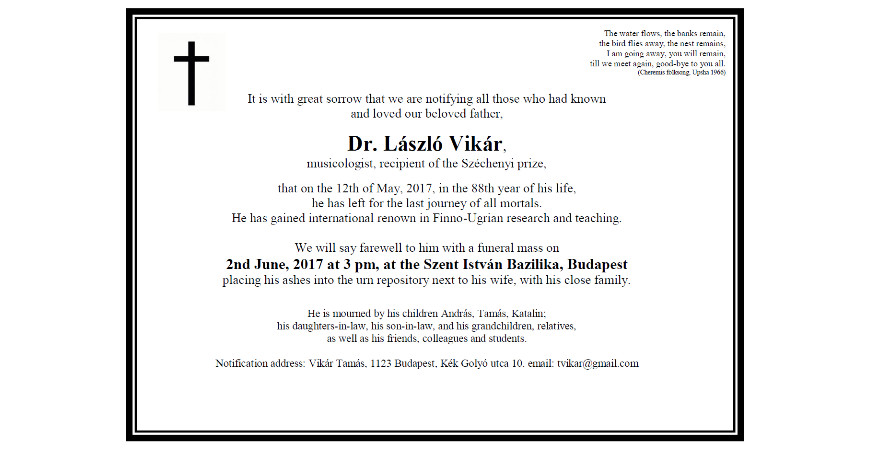Obituary – László Vikár
It is with profound sorrow that we announce the death of László Vikár at the age of eighty-eight, the Széchenyi Award-winning ethnomusicologist and former professor of the Liszt Academy.

Perhaps it was also his surname that obliged him to choose the career he eventually picked, as he was a distant relative of Béla Vikár, one of the first folksong researchers. He was the heir of Zoltán Kodály and Bence Szabolcsi’s academic legacy, though at first he enrolled at the department of music education and choir conducting of the Liszt Academy, and only later did he go on to study musicology. After his graduation, Kodály almost immediately took him as his colleague, he became a member of the Folk Music Research Group of the Hungarian Academy of Sciences, then moving on in his career path, he was the head of Folk Music Department (and the successor of the group) of the Institute of Musicology for a decade and a half from 1977 until 1991. One of his basic principles was that ethnomusicology was not doable without field word, as the researchers of folk music were not only to understand music but also the people doing music. In this spirit, he collected more than 8000 tunes during his lifetime. He would often go to Transylvania, Upper Hungary and Trans-Danubia. The major part of his legacy concentrates on his oriental music research focussing on the ancient history of Hungarian folk music. He primarily collected the tunes of Finno-Ugric and other related peoples, but in addition to the folk music of the Mari, the Chuvash, the Udmurts, the Mordvins, the Bashkirs and the Tatars, he also worked intensely with Chinese, Turkish and Bulgarian folk music. His findings on Trans-Uralic folk music were published in four voluptuous volumes in English in collaboration with the linguist, Gábor Bereczki. He authored more several dozens of books and many more than a hundred articles. From the 1970s onwards, he was member of the academic staff of the Liszt Academy for nearly thirty years, and as Folk Music was a compulsory subject for all students, he taught thousands of them during his pedagogic career. It is not much exaggerated to say that as to ethnomusicology, most participants of today’s Hungarian music scene were once Vikár’s students, and thus he had a monumental impact on the current music life of Hungary. As only the greatest educators, he did not only teach the actual material but the students themselves, he did not convey information but an attitude. Although he had not been teaching at the Liszt Academy for quite some time before his death, we will greatly miss his scientific accuracy, never-ceasing curiosity and his undying enthusiasm for folk music. His legacy will, however, accompany us, and it is our absolute duty to protect and cultivate it.
May he rest in peace!


